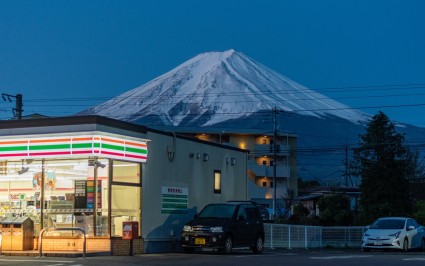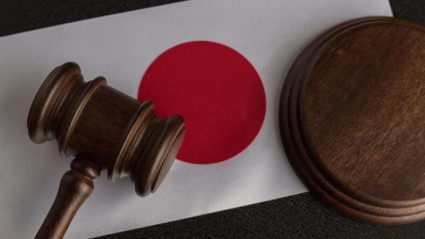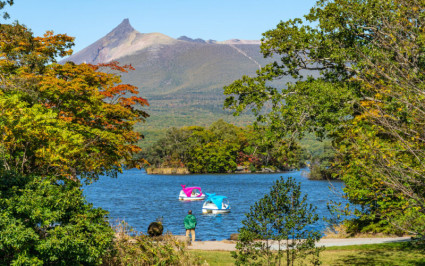Tokyo’s a great city – world’s 4th best, say U.S. travel magazine AFAR and New Zealand marketing consultancy Resonance; 8th best, say U.S. business magazine Forbes and British media group Time Out; 6th, according to global lifestyle magazine Monocle’s Quality of Life Survey. It pulses and throbs, it bursts its bounds, it’s the greatest single agglomeration of human beings (37 million) on Earth. Other cities (not many) are thought more exciting (not much), but factor Tokyo’s relative safety and cleanliness into the equation and you find yourself musing that here, if anywhere, is an urban success story of the highest order.
Pause, says Spa (June 11). Withhold judgment. There’s a fly in the ointment. Tokyo’s wonderful – if you’re rich. Few are. Even the moderately wealthy struggle to make ends meet, so costly has Tokyo living become. Many – their numbers increasing lately, the magazine finds – deem the game not worth the candle, and move out. That too costs money. The poorer strata – economically average and below – grit their teeth, stay, and lead what must be very pinched lives indeed.
It’s not just Tokyo, of course. High prices are a fact of urban life everywhere. But Tokyo is our subject here and quite enough of one; we needn’t expand it. Big-city excitement measured in terms of culture and nightlife is the asset most prized by the young and carefree and by those who rank the world’s “best cities,” but the truth generally speaking seems to be that once we get past youth into the work-and-family phase of life, our concerns shift elsewhere. Is housing affordable? Are schools good? Is nursing care available? Prosaic issues enough, but poetry, if life rises to that, must rest on prosaic foundations. Spa offers some case studies.
“Keita Moriyama” (names in quote marks are pseudonyms), is 41 and works for a leading communications firm. His wife works part-time. Together they earn 10 million yen a year – not bad, more than twice the national 4.14-million-yen average; still, not enough, as the couple discovered when they began to think of leaving the apartment they rent and buying a home. How much would they spend? Sixty million, they decided – “I don’t want to spend the rest of my life struggling to pay the housing loan,” says Moriyama. With that figure in mind they went shopping. They were soon disillusioned. Anything new was out of the question. The second-hand prospects they were shown were either cramped, or far from the nearest station, or positively rickety with age.
What to do? Lower their sights and stay within budget? Stretch the budget and keep their aim high, banking on future wage raises that may (but may not) be better than past ones? Stay where they are? Move to the distant suburbs or beyond even them? “If only I’d bought 10 years ago,” sighs Moriyama, thinking of friends who did just that – just in time, for 10 years ago is when housing costs in the capital began an upward trajectory that has yet to peak.
We leave the Moriyamas with their dilemma still unsettled, and turn to consider “Mina Toyama,” 44, mother of two daughters, one in third-year high school, the other in second-year junior high. Household income: 8 million yen. The 2LDK flat they rent for 180,000 yen a month has served them well enough to date but the girls are growing up, stretching their horizons; the walls begin to close in. Maybe every family reaches a point of needing its own home to feel at home in.
Fifty million yen: That much they could afford. What would the market offer? A curt rebuff. “Prospects were zero,” says Toyama. Other pressures arose. The older daughter wanted to study in Canada. Can a parent say no to a child’s thirst for education? Off she went. Cost: 3 million yen for six months – plus her Japanese school fees, 70,000 yen a month, which, her absence being only temporary, still had to be paid.
The six months abroad were a success. The girl’s English grew fluent. She was meeting new people, doing new things. Couldn’t she stay longer? Again – can a parent say no and at what cost to the child’s future? To make a long story short: the family moved – out of Tokyo, to Yokohama, into a house smaller than they’d hoped for, farther out than they’d planned, and 30 years old besides – but, at 35 million yen, affordable. May they make the adjustments it demands and live happily ever after.
One more story to cap our urban panorama. It features rap musician TKda Kurobuchi, at home in his three-and-a-half-mat room in Tokyo’s Shibuya Ward. Room? Closet. No fridge, no cooking stove – “the bento shop is my kitchen,” he tells Spa wryly. Bath and toilet, not mentioned, are presumably also external. What can you do in such a space? Anyone inclined to claustrophobia would be squeezed in it like a lemon. Clearly Kurobuchi is not so inclined. He seems perfectly cheerful. He is a musician; like any artist, he turns his life and everything in it, good, bad and indifferent, into seasoning for his art, transmuting in the process bad into good. In the final analysis, he says, Tokyo is Tokyo, giving what only Tokyo can give, regardless of where in it, or even how in it, you live. The game not worth the candle? He will surely tell you otherwise.
© Japan Today













26 Comments
Login to comment
sakurasuki
JGovt still wondering why Japanese people don't have more kids today.
dagon
Action News at 11.
Welcome to New Capitalism Neo-feudalism.
DanteKH
Read a recent study showing that in Tokyo and Yokohama 90% of thr high rise building apartments are sold out to Chinese and Taiwanese "investors", while 100% are directly sold to real-estate agencies, never to an individual person. Which they resell for almost double the price.
And yes, 10 mill JPY per year is no longer enough for a Familly with children to live and prosper in those times of Yen crash and hyperinflation due to it.
藤原
Lived in Japan for 18 years. Nagoya 5 years, Kyoto 5 years. living on Noto Hanato now almost 8 years. Even though I lived through the events of January 1st living only 19 km from the epicenter. Still Noto cho is by far my favorite place to live in Japan. My wife who is from Aomori still loves it here.
Tokyo and the Kanto Region and even Eastern Japan as a whole both of us feel we really feel that lifestyle is not for us even Aomori. When I take my family to Kyoto or Shiga for a few days we actually really get tired of the urban lifestyle after a few days and we always have the conversation and ask how could people live like this. Urban lifestyle not for me or my family. We enjoy visiting the city for shopping and getting away for a day or two.
tora
Might finally encourage people to get out of Tokyo and decentralisation. And people are realising that living in the equivalent of a shoebox at exorbitant prices and wasting your entire life paying for it working for a pittance is not "living".
It's funny how the market will determine the fate of Tokyo. The establishment and politicians choose to keep their heads buried in the sand.
Mocheake
Move out of Tokyo. Biggest part of the problem gets solved. Thirty minutes to one hour away by train are beach side and rural communities and properties for sale that are about 40 percent cheaper and with more space. I've never understood the allure of living in a building with 500 other people, where you can hear all of neighbors arguments, and have to line up to get in an elevator.
kohakuebisu
The first couple on 10 million with a budget of 60 million yen can buy an old house and do it up. That budget is only 300k GBP or 400k USD so the idea of them buying in London or New York would be completely out of the question. In Tokyo, it is possible. Their food budget and energy costs are likely smaller than London or New York, and they have access to better public transport. They can cycle to the local station without their bike being stolen several times, as it would be in London.
The family spending 3 million plus 70000 x 6 on one of two daughters has ideas way above its station. 8 million yen is only 6.4 or so milllion takehome, so there is something weird going on somewhere for them to be using private education, paying 2 million plus in rent, and then spoiling their kids. I don't understand why Tokyo wouldn't be subsidizing them that 70000 a month if they earn that little. Isn't high school free for families on under 9 million? Its 7 million in Nagano.
I'm not writing this because I think it is easy to raise a family. It is not. I am against sensationalist, context-free reporting and use of weird examples that do not garner sympathy, e.g., "we can't buy a 'only luxury ones exist' newbuild condo and "we can't live like a 15 million yen family on 8 million yen". There are plenty of far better examples out there, if reporters can be bothered to find them.
kohakuebisu
The headline says "moderately wealthy". A family with two teenage daughters on 8 million yen gross is not remotely wealthy.
opheliajadefeldt
The same thing is happening in USA's cities, most have become too expensive to live in, and so many former residents are moving out to the suburbs. But of course it will not affect the wealthy.
Mr Kipling
Japan is much cheaper to live than almost anywhere in old Europe.
There will always be those complaining. The guy having a hard time after spending more than half his salary on his one daughters Canadian junket needs some financial advice.
Pukey2
There should be a law in all countries - housing should be reserved for residents of Japan who are going to live in that appartment/house, unless maybe if it's one of those dilapidated sheds in the outbacks.
Pukey2
Typo: residents of that country .
Speed
Five bedroom house - albeit a bit old - for 15 million yen out in the countryside. Clean and uncrowded. Income around 4-6 million a year and not too hard to make ends meet.
The farther away from Tokyo, the better economically, although I agree, it's a great city.
ArtistAtLarge
Capitalism has always failed the poor and now it is failing the middle class
Mr Kipling
Poor life choices will hurt you. Renting or rather paying for someone else's building, spending half your salary on one daughter's whim, or other reckless spending will put you in difficulty. Sorry, not much sympathy for the people in this article.
DenTok2009
How come no financial info on the rap musician? How much money is he making and how much is he paying for rent? Are utilities covered, or does he pay per usage (e.g., 100 yen for 5 minutes of hot water for the shower)? Does he use the laundromat?
I knew one girl who rented a room in a house where the elderly owners renovated the second floor. The rooms were small, so it might have been three and a half mats or four mats, with a sink and one burner stove. The toilet was not the flushing kind. The owners scrubbed it often and kept the hallway clean. The house was a couple of minutes or so from Yotsuya sanchome. I've forgotten whether all the rooms were metered and the tenants had to pay the utility bills themselves, or the owner just figured it out from one meter and divided accordingly. She went to the sento and the laundromat. Rent, utilities, sento and laundromat might've been half her salary. I remember being amazed at how cheap her rent was for the location. (This was during the bubble era.)
grund
As some have already pointed out, Tokyo is really not very expensive to live in compared to other major cities, as long as you rent. Buying a house can indeed be very expensive unless you want to commute an hour or more.
What is expensive though is education. Private schools and cram schools and extracurricular activities can easily swallow up half the parents' paycheck.
Redemption
I live in Setagaya and all new condos are from 8 million or price not displayed because so astronomical. These condos are replacing houses and the accompanying influx of new cars is making the qol fall in my opinion.
Redemption
80 million
Roger Gusain
An annual salary of about 30 million yen is OK for Tokyo, but you will feel like a pauper if you venture overseas.
Roger Gusain
You have to be wealthy to live in central London or Manhattan these days, and they have become boring. Tokyo is about 30 years behind the curve, but is rapidly catching up, I am sorry to say. Nothing lasts forever.
GBR48
"Cost of Living Including Rent in Tokyo is 44.8% lower than in London" [Numbeo]
Stop whining. Move somewhere cheaper like everyone else on the planet does. Bag yourself a nice house with a garden for much less cash.
Sven Asai
Stay there, please. Moving out is even a worse solution, because then all those above average 'moderately' wealthy people bring the rapidly high rising prices into suburbs, countryside and villages too.
Gene Hennigh
It is the same in New York and Seoul and a lot of other mega cities. The money creeps up and up until there are, essentially, two classes of people. Still, there is a draw to these places. That's how they became mega cities. I'd visit and enjoy it, but little ol' Komaki was fine with me. I live in a small city with a university and corn fields side by side. I like it. Tokyo for a vacation, then back to my vacation of a home.
Redemption
I have friends who left Tokyo and good options for them where they say they are happy are Fujisawa and the other way to Tsukuba. Both have easy access to Tokyo.
BertieWooster
How tough it must be for them, with the cost of fois gras and Chateau Lafitte out the roof!